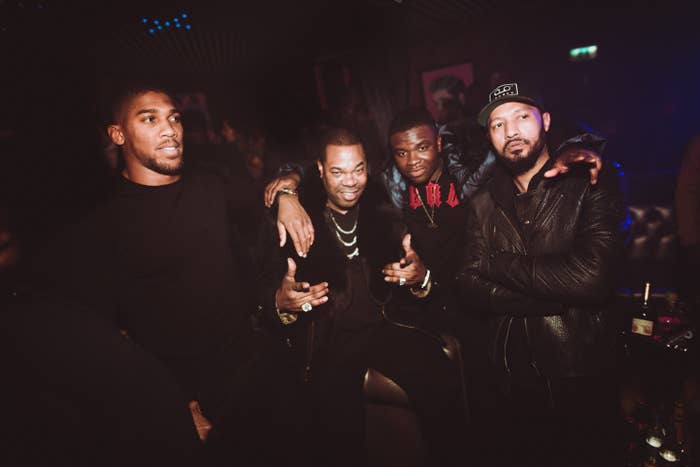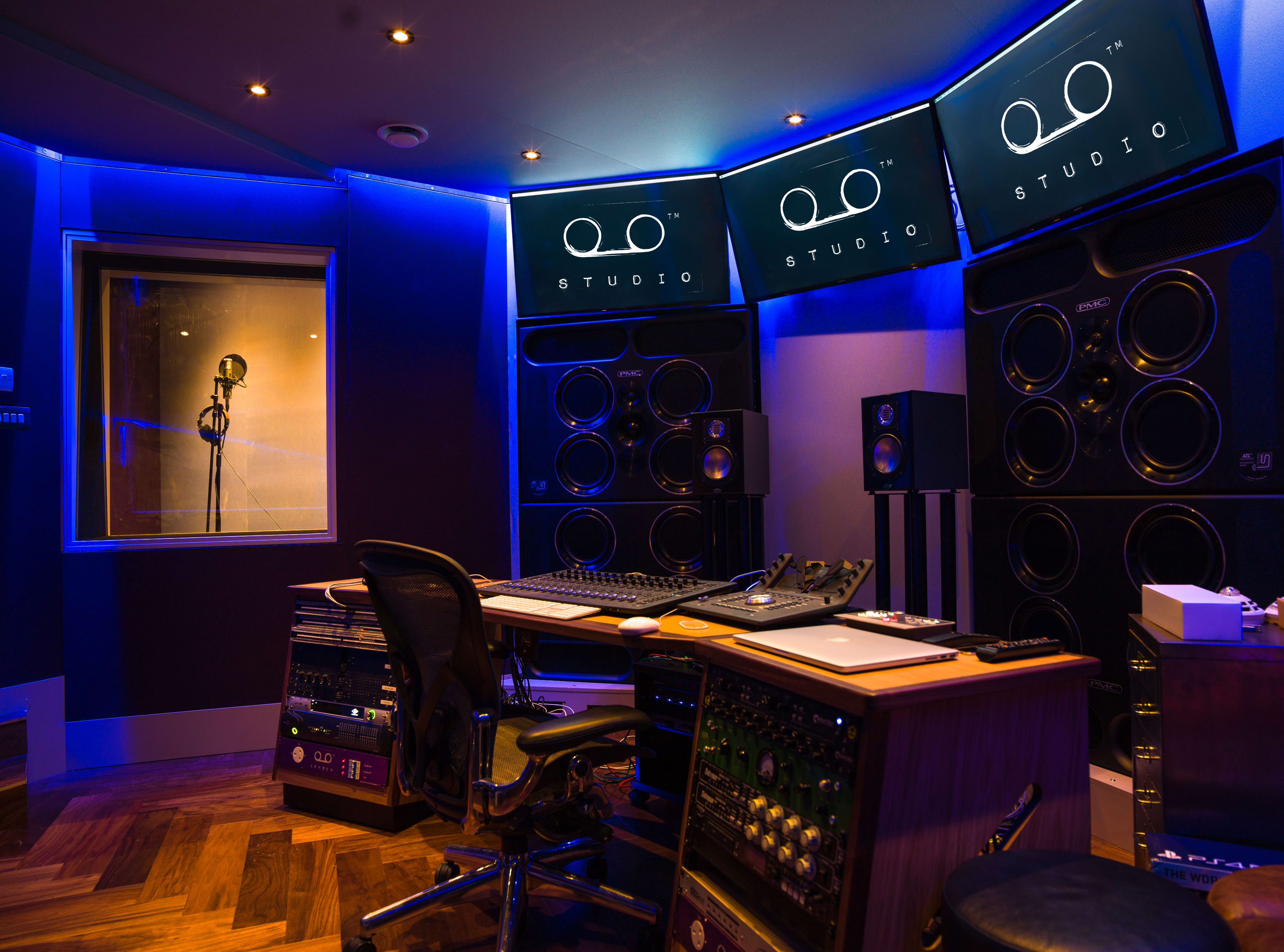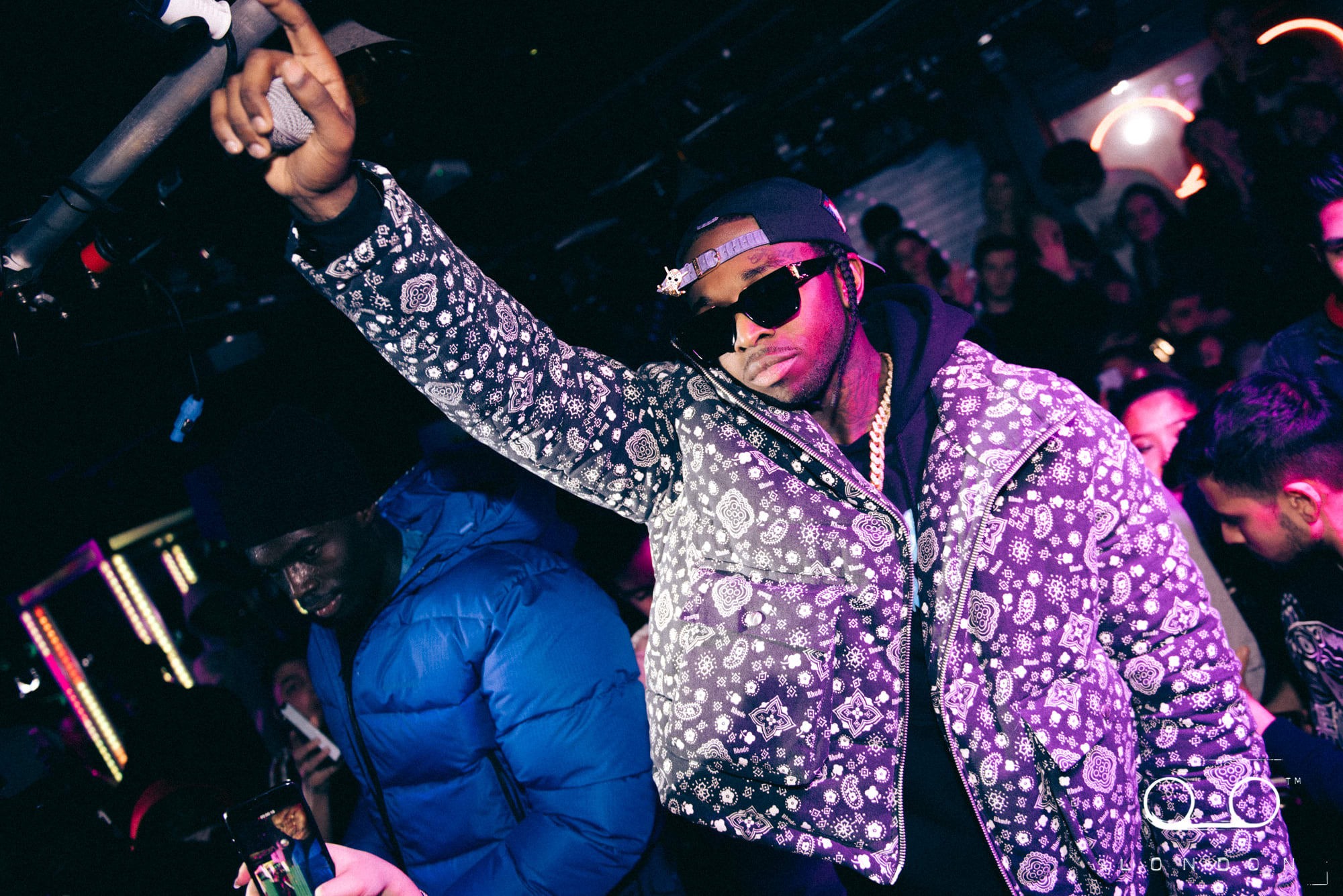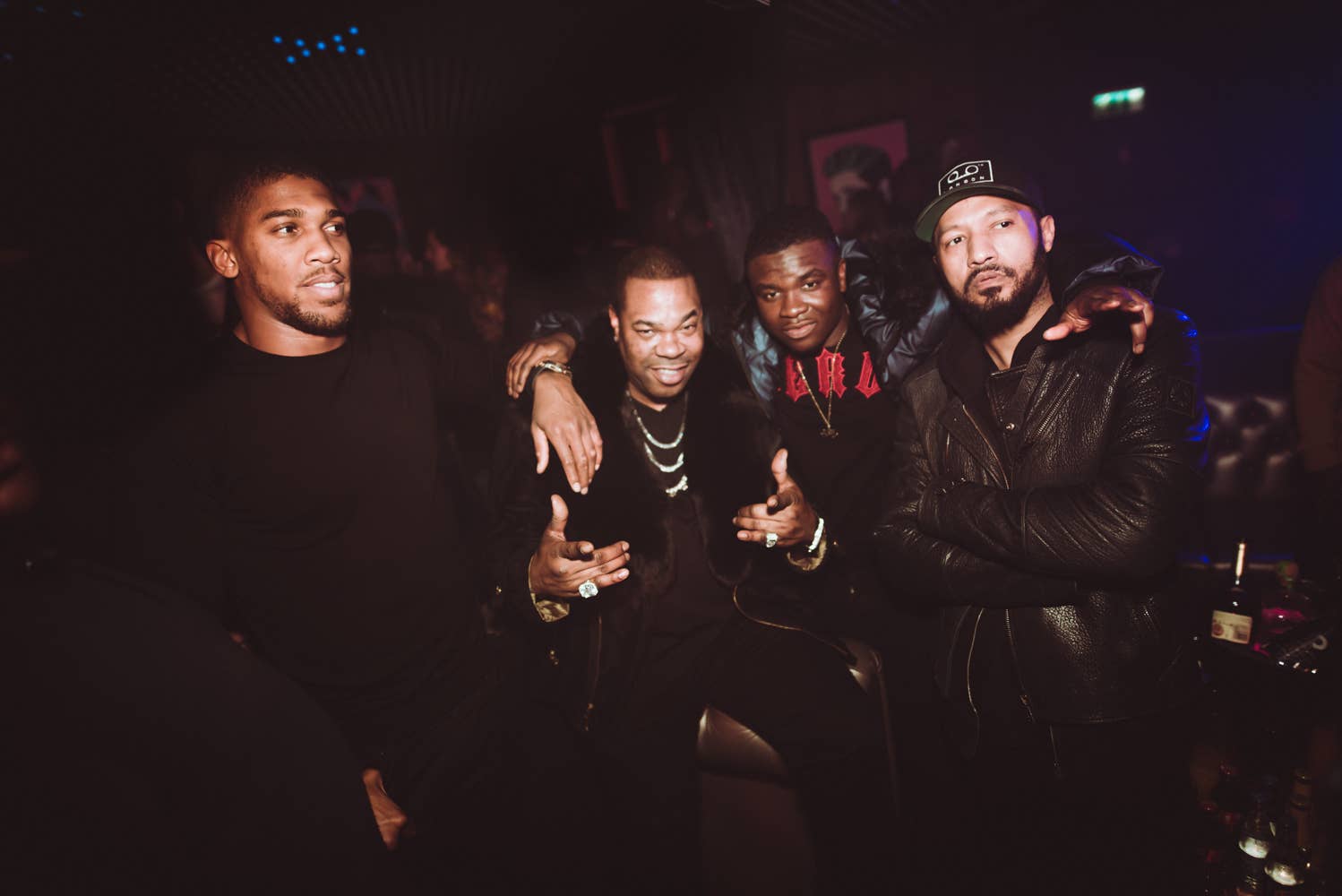
During the COVID-19 pandemic, many of the UK’s 1600-plus nightclubs and live music venues were facing indefinite closure before the government stepped in with a grant to keep them open. The pandemic hit the industry hard, and it may take months—years even—for normality to fully resume.
For West London’s Tape London, however, their plan to merge nightlife with the music business has allowed them to shift their focus away from hosting hedonistic nights and towards their long-term goal of creating music in the same building. With producers on their roster and a recording studio next door, Tape has been able to bring to life the idea of having artists partying in the club and then recording tracks with them in the very same night. Their advanced studio features the only pair of PMC QB1 XBD speakers in the UK, which allow for crystal-clear audio to be pumped out in a soundproof room that blocks out the sound you typically hear in other parts of a club.
The late Pop Smoke, Migos, Ludacris and Stormzy are just a few of the rap elite that have made music in Tape’s studio off the back of partying in the club, while the likes of Drake, Travis Scott, Future, Ella Mai, Koffee and Cardi B have performed live in front of small crowds of around 300, the club’s capacity. One night last year, AJ Tracey, MoStack and Steel Banglez were partying at Tape with their respective crews and, somehow, the stars aligned and they ended up hitting the studio next door. The end result was the chart-invading “Fashion Week”, which in-house producers The Elements had a big hand in. The track peaked at No. 7 and spent 15 weeks in the official singles chart. Tape was also involved in another recent hit: Tion Wayne, Stormzy and Dutchavalli’s “I Dunno”, produced by The Elements just before lockdown, which also entered at No. 7.
Tape’s vision of using their nightclub as a hub to carry out A&R functionalities with some of the world’s biggest artists has begun to manifest, with even more projects on the horizon. Complex spoke with the team (Zues Sherlock, Heff Moraes, Jermain Davis, David Boyo, Steel Banglez) to discuss their transition from hosting events to becoming a powerhouse in the music business.
“We see ourselves as a cross between Shoreditch House and Motown Records.”

COMPLEX: How has Tape London worked through the COVID-19 pandemic, not being able to put on any of your popular parties or album listening events?
Heff: The model for Tape was always for us to have a music division. We spent the first three years of the business establishing the nightclub but always knew that the music side of the business was a key part of our USP. So at that point, we had a studio and had artists and producers working in that studio. Over the past two and a half years, we’ve really ramped that up. We’ve made the nightclub stable and established Tape as one of the biggest brands in London nightlife and entertainment so the coronavirus only impacted the events side of the business. It didn’t impact the music-making at all.
Do you think the coronavirus will have a long-term effect on the nightlife industry?
Jermain: I think it will probably take a minute, but eventually, things will go back to being as they were. What we’ve seen out of this is a lot of creativity, like Travis Scott’s event on Fortnite. We expect to see an increase of digital initiatives.
How did the idea of the Tape nightclub first come about?
Zues: It was an opportunity that came about through my business partner, who was approached to invest in a space at the time. We came and had a look at it and, at that point, it made sense because we all have a passion for music. Having been around the West End and having been involved in the nightlife industry for quite a while, when this came up, we came in initially as just investors. Then an opportunity came to take over, then we took over and implemented our vision which was combining music and nightlife. The idea was always to make our own music, play our own music and perform our own music.
David: We wanted to build an ecosystem around music. For us, everything begins with and revolves around music. Our music ecosystem connects the studio to the dancefloor and, ultimately, to the world.
The club has been known to attract some pretty huge names—how did you manage to build relationships with such high-profile artists and creatives?
Zues: Back to the beginning, we’ve always been actively involved in the music industry. I was a manager myself, Heff was one of the biggest engineers in the country, and Jermain is an artist. Within that network, there’s a lot of relationships there. I spend a lot of time in the States and I used to work with Ryan Leslie. Our connections with American artists is actually one of our biggest strengths because we’ve always nurtured these relationships authentically. When we launched, it just made sense that Tape became a home for artists and their wider networks. We protect the privacy of our network so, for example, we do not engage with paparazzi or encourage pictures to be taken for news sites. When artists or high-profile guests have a night off, they might not always want people to know they’ve been out so we have a separate door where artists can leave from.
David: Yeah, and because of that, in addition to the great relationships we have and the privacy we offer, they naturally keep coming back.
The club’s also become known for spinning exclusive new music. Give us some examples of songs that were first debuted at Tape.
Jermain: The first one that comes to mind, obviously, is the Drake and Giggs track, “KMT”.
Zues: It went viral. The video went viral, the first time he played it. But we’ve had loads. I’ve played exclusive Justin Bieber stuff, PARTYNEXTDOOR as well. We also did “Man’s Not Hot”. Busta Rhymes and Big Shaq met here at Tape. When Busta was here, I called Michael [Dapaah] and he came through and performed the track here for the very first time.
What are the benefits of recording at Tape’s studio vs other studios?
Steel Banglez: Mate! Let me tell you something: the studio in Tape is world-class. It’s unbelievable. The way it was designed with Heff’s vision, the speakers, the microphone chain, the energy and the quality is undeniable. The experience that you have in Tape, in the vocal booth, in the lounge, the club’s going on, the ambience, the art on the walls, the lighting, it gears you up as an artist to create something you wouldn’t normally create.
Heff: With Tape, quality is extremely important. So if we’re going to make music, we’re going to make great music and music that sounds great. I come from a heritage of being extremely proud of UK music and the way in which it sounds. In order to make a record that sounds great, you need to have a great studio, you need to have great monitors because then you’re going to hear stuff that you wouldn’t be able to hear at home. That room is designed around the best speakers on the planet, and it’s acoustically treated to make them sound incredible. That gives The Elements, other producers that work there, and myself, clarity. When you can hear clearly, you can make great-sounding records. The reason you need to speakers like that is to make great-sounding records.
From an artist chilling in the VIP section to recording a track in the studio sounds like a very interesting process. How does this usually go?
Heff: The whole model of having a studio here is what Tape is about. It’s about creating opportunities in a nightclub that wouldn’t normally exist in the music business elsewhere. A great example of that is the record we made with AJ Tracey, MoStack and The Elements, “Fashion Week”. They were all partying in the building, separately, and then they all ended up in the studio and made “Fashion Week” in one night. I always use that as an example of the Tape model in action. That’s exactly what it was designed to do, and that’s exactly what it did. We have the A&R capability that record labels would die for. Any artists coming from the US, or anywhere internationally, will end up here. All they need to do is get in the studio and we can make hits. The transition is about bringing people into the nightclub to have a great time, then hopefully they end up in the studio, making a great record with our producers.
David: The relationship between a recording studio and a club is a natural one, because the eventual music is played in a club. When they’re in the recording studio, they get inspired from the club; when they’re in the club, they get inspired to go and produce in the studio. We’ve observed this scenario play out more than a dozen times, with significant success. The successes have made it fashionable: artists that have been to the club now also want to record at the studio and capture moments of them in the studio on their social media, almost like a modern-day Abbey Road.
View this video on YouTube
You guys were closely involved in Tion Wayne, Dutchavelli and Stormzy’s 2020 chart smash, “I Dunno”. How that that connection come about?
Heff: It was recorded here at Tape, but I don’t think that track was recorded on a club night. The Elements are producers that we manage and they’re working with lots of artists and there’s a lot of exciting projects on the horizon. But the Tion Wayne track came about just before lockdown—they’ve been working with him on and off for a while, then this track came up and things took a turn from there. From “Fashion Week”, The Elements have started to get a good name for themselves.
Steel Banglez: The family at Tape and myself mentored The Elements. My side was the production and helping to co-produce, but I wouldn’t say that it was just me solely. I’m still around producers that haven’t had a hit record, that haven’t had a top 10, that haven’t met some of the A-list celebs. But having the Tape Studio where it is, and working with such a great team, we can make things happen just like that. So my credits go to Heff and Zeus; I just helped to monitor things and collaborated with The Elements naturally, then things just evolved from there.
Zues: Banglez is like my little brother. He’s someone who’s supported Tape since the very beginning. This is like his home.
Heff: And the story of The Elements taps into what Tape set out to do at the beginning, which is to create a platform that delivers great entertainment, but also a platform to develop talent and then share that talent in the nightclub. We met one of the members of The Elements because one of them came for an internship job in the studio here. I interviewed him and when I heard his music, I quickly realised he was very talented. So he went from being an intern to one of the biggest producers in the country in 18 months.
What’s been your favourite studio session at Tape so far?
Heff: For me, it has to be the session we recorded “Fashion Week”. Some of my other standout studio sessions include PARTYNEXTDOOR, Kendrick, and a Migos session—those nights were extraordinary because those guys are the best in the world. So to have them in the room was an honour.
Daniel: It was around the time Banglez joined forces with us in 2015. Justin Bieber, who has a very strong relationship with Zues, he had an album coming out and he called last-minute on a Sunday, when the club was closed, and asked if he could record here. That just happened to be the night when all the stars were not aligned: our engineer wasn’t available, it was 12 o’clock at night, and people were sleeping. Obviously, when Justin Bieber calls you, you’re going to want to record that track! Zues jumped on the phone and called Banglez. At the time, Banglez wasn’t clearly versed with the studio but he said, “Fine. I’ll engineer the session.”
Steel Banglez: Yeah, I got to the studio and it was like the Queen was there! There was about 15 security guards, and Zeus was like, “Can you turn on the studio?” I was like, “Yeah, not a problem. I’ll figure it out.” But I couldn’t turn the studio on! [Laughs] Justin Bieber was just looking at me; I felt like a wally! The day before that, I asked our previous engineer to send me a video of how you turn the studio on. I didn’t think it would be that hard, but when it came to it, I still couldn’t turn the studio on. Even Zues is at one point pressing buttons, trying to turn it on. Then Justin was like, “Look, man, forget it. I’m gonna go home,” and he just left. I drove home with a stern face [laughs]. I could’ve cried because, back then, I wasn’t as successful so having that opportunity was like gold dust. This was back in 2015, just after V Festival.
Zues: Ajay, just so you understand: obviously, me and Banglez have conversations about what we want to do and who our dream artists are to work with. Justin was top of the list for Banglez. When Justin asked me if he can use the studio on that particular day, I was like, “Yeah, no problem. The studio will be ready.” Not even questioning that Banglez will come. This is why I rate Banglez’s hustle and why I think he should be an example for all producers. I called him and he was somewhere in Canary Wharf, but he was there in no time.
Steel Banglez: I’ve never driven down the A13 that quick in my life!
“When Pop Smoke came by—just before he passed—it was an incredible night! The energy was literally electric.”

Drake, Travis Scott and Future are just a few of the artists that have performed at the venue. The club can only hold 300 people, so what are those more intimate sets like?
Jermain: When you go to see a concert, the artist and their approach to their performance on a massive stage, it’s a different energy. But when they come to the club, they’re just like you and me: they’re coming to the club to hang out with their boys. There’s a different energy that they’re coming in with—they’re having a drink, they’re chilled. The people that are there feel like they can reach out and touch them; it’s more of a house party vibe. It goes off! It’s an amazing energy. Travis Scott, Rae Sremmurd, people are hanging from the ceilings and the energy is crazy!
Heff: When Pop Smoke came by—just before he passed—it was an incredible night! The energy was literally electric. When you get a room with 300 people in it and global stars, something extraordinary happens. They’ve just come from playing at the O2, where there are thousands of people, then come to a room that’s got 300 people in it and people are right in their face. It’s a completely different experience.
Steel, you’ve recently partnered up with Tape for a joint venture called Tape Gifted. Tell us more about that.
Steel Banglez: I grew up in East London and I’m from the pirate radio era. I grew up around the late decline of UK garage and the early emergence of grime and my next-door neighbour was D Double E, one of the greatest grime MCs of all time. As a kid, I used to watch him and I used to go to Eskimo Dance, Palace Pavillion, sneaking into places and watching the likes of N.A.S.T.Y Crew, Roll Deep and Boyz In Da Hood on stage. Back then I used to think, “One day, I’m going to have my own label and it’s going to be big!” So I was watching all these guys rap and speak their pain, and in the background, I started becoming a producer. I started planning that at a very young age, then I got to a stage where I was able to meet rappers and produce for them and put my Steel Banglez tag on the songs. Through that, I built my brand. Once I signed my deal at Warner Brothers, I also signed Gifted Music, which was the original deal I signed. Since then, we’ve sold millions of records on Gifted already. Everything was a joint venture, so now we’re partnering up with Tape. The way Tape Gifted is, it’s a production powerhouse, a songwriting powerhouse, where we’ll create artists who become the future of the UK.
David: We’re really excited about it, too. What we envision is Banglez putting together a team of different producers and writers that we’ve identified and putting a camp together where we can create loads of beats. Then we will start to decide what we want to do with those beats, as we then bring in various different artists to listen to the beats and see which beats they naturally fit on.
Will Tape Gifted be releasing a project soon?
Heff: There is a project coming soon. It’s difficult for us to share too much detail about it, apart from, it’s fucking great! And all the people here are involved, as well as some really exciting artists. Because there’s some stuff going on in the background, we can’t share too much detail about it, but sooner rather than later, it will become public knowledge.
Daniel: We’ve got a few artists that we believe have the potential to be superstars, so keep an eye out for it.
Where do you hope Tape London will be in the next five years?
Heff: What we’ve done in London is show proof of concept. The way we see it, every major city in the world should have this type of platform. We see ourselves as a cross between Shoreditch House and Motown Records. Shoreditch House because it’s a destination in every capital, and Motown because we’re developing a music hub which promotes and develops upcoming music in that city. We’ve done it in London, and we’ve succeeded. So there’s no reason why we can’t do it in New York, LA, even Shanghai. There’s a huge music industry in those cities, and it needs something like Tape to connect the big corporates, for want of a better word, to the streets. And that’s what we do.
David: Within the next five years, our growth globally, as pointed by Heff, will be underpinned by major strategic partnerships and a plethora of major artists that would be developed through the Tape machine. We would have also built a strong stable of talented producers and songwriters.


